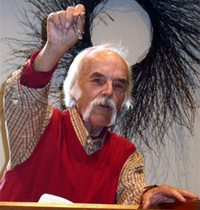
NOTES from the UNDERGROUND No. 195 | August 10, 2009
WHAT DO WE DO ABOUT US?
This seems to be an appropriate follow-up to the last posting on this site (scroll down) …part review, part excerpt from a brilliant book, WHAT WE LEAVE BEHIND), that puts us precisely in our place, our predicament, and pushes the wake-up button—NOW!
Though I suspect it’s already too late.
I‘m continually reminded these days that the Maya calendar stops at the year 2012—the end of history.
And after reading the news report below on the state of the homeless in America …after trying to understand, reconcile the many differences in our country: race, health care, corrupt politicians/political parties, privileged classes, corporate domination/corporate welfare, religious intolerance, hate mongers, loss of work/ workers’ representation, the rape of nature, the celebration of violence, the stupidity of celebrity, consumerism run amuck…or hearts of darkness growing darker by the day…(‘they’ now want us to believe it’s un-American to publicly insure the ill in our sick society—despite public schools, public highways, public libraries, public mail delivery, public media, Social Security, Medicare, etc.)…I’d say we’re ready to be erased.
Still three more years away? Hurry sundown.–Norbert Blei
![]()

Attacks on Homeless Are Rising,
Many Simply Motivated by Thrill
by
Eric Lichtblau
WASHINGTON — With economic troubles pushing more people onto the streets in the last few years, law enforcement officials and researchers are seeing a surge in unprovoked attacks against the homeless, and a number of states are considering legislation to treat such assaults as hate crimes.
This October, Maryland’ will become the first state to expand its hate-crime law to add stiffer penalties for attacks on the homeless. The District of Columbia approved a similar measure this week, and another such bill was introduced last week in Congress.
A report due out this weekend from the National Coalition for the Homeless documents a rise in violence over the last decade, with at least 880 unprovoked attacks against the homeless at the hands of nonhomeless people, including 244 fatalities. An advance copy was provided to The New York Times.
Sometimes, researchers say, one homeless person attacks another in turf battles or other disputes. But more often, they say, the assailants are outsiders: men or in most cases teenage boys who punch, kick, shoot or set afire people living on the streets, frequently killing them, simply for the sport of it, their victims all but invisible to society.
…”A lot of people we see are thrill offenders,” said Brian Levin, a criminologist who runs the center for the study of Hate and Extremism at California State University, San Bernardino.

Only Thursday, two homeless men in Hollywood were stabbed to death and a third was wounded in a three-hour spree of separate daylight attacks. The police arrested a 54-year-old local man who they said appeared to have made homeless people his random targets.
Researchers say a combustible mix of factors has added fuel to the problem. Rising unemployment and foreclosures continue to push people into the streets, with some estimates now putting the nationwide number of homeless above one million.
And in cities like Las Vegas, public crackdowns on encampments for the homeless and cutbacks in social services have frequently made street people more visible as targets for would-be assailants.
Further, in the last several years the Internet has seen a proliferation of “bum fight” videos, shot by young men and boys who are seen beating the homeless or who pay transients a few dollars to fight each other.

Indeed, the National Coalition for the Homeless, which works to change government policies and bring people off the streets, says in its new report that 58 percent of assailants implicated in attacks against the homeless in the last 10 years were teenagers.
Michael Stoops, the group’s executive director, said social prejudices were “dehumanizing” the homeless and condoning hostile treatment. He pointed to a blurb titled “Hunt the Homeless” in the current issue of Maxim, a popular men’s magazine. It spotlights a coming “hobo convention” in Iowa and says: “Kill one for fun. We’re 87 percent sure it’s Legal.”
With victims wary of going to the police, statistics on the attacks are often incomplete. But surveys show much higher rates of assault, rape and other crimes of violence against the homeless than almost any other group, said Professor Levin, of California State, who worked on the report.
Recognition of the problem is spurring legislative action.
“More and more, we’re hearing about homeless people being attacked for no other reason than that they’re homeless, and we’ve got to do something about it,” Representative Eddie Bernice Johnson, Democrat of Texas, said in an interview.
Ms. Johnson introduced a measure in the House last week to make attacks on the homeless a federal hate crime and require the F.B.I. to collect data on it. (The Senate voted last month to expand federal hate crimes to include attacks on gay and trans-gender victims, another frequent target.)

And in addition to the measures already approved in Maryland and the District of Columbia, proposals to add penalties for attacks on the homeless are under consideration in California, Florida, Ohio, South Carolina and Texas.
The push has lacked any organized support by major civil rights groups. In Florida, which leads the country in assaults on homeless people, groups like the Anti-Defamation League have opposed recognizing those attacks as a hate crime. Opponents argue that homelessness, unlike race or ethnicity, is not a permanent condition and that broadening hate crimes to include it would dilute the law.
“I hear the same rhetoric all the time,” Ms. Johnson said. “They ask, “Why is their life more important than anyone else’s?”
The coalition’s study, which relied on police and news reports but excluded crimes driven by robbery, found 106 documented attacks against the homeless last year.
That was a doubling of levels seen six or seven years ago but a sharp drop from 2007, an apparent improvement that researchers are still trying to explain. The study found 27 fatalities last year, flat relative to the year before. Eight others were shot, nine raped and fifty-four beaten.
In Portland, Oregon, two brothers were charged with five unprovoked attacks against homeless people in a park. One of the victims was a man beaten with his own bike, another a woman pushed down a steep staircase.

In Cleveland, a man leaving a homeless shelter to visit his mother was “savagely beaten by a group of thugs,” the police said. In Los Angeles, a homeless man who was a neighborhood fixture was doused in gasoline and set on fire. In Boston, a homeless Army veteran was beaten to death as witnesses near Faneuil Hall reportedly looked on. And in Jacksonville, N.C., a group of young men fatally stabbed a homeless man behind a shopping strip, cutting open his abdomen with a beer bottle.
In Las Vegas, home to a large population of the homeless, there were no reported killings of any of them last year, but many say hostilities have risen as the city moves to get them out of the parks and off the streets.
Some of the Las Vegas homeless resort to living in a maze of underground flood channels beneath the Strip. There they face flash floods, disease, black widows and dank, pitch-dark conditions, but some tunnel dwellers say life there is better than being harassed and threatened by assailants and the police.
“Out there, anything goes,” said Manny Lang, who has lived in the tunnel for months, recalling the stones and profanities with which a group of teenagers pelted him last winter when he slept above ground. “But in here, nothing’s going to happen to us.”
Their plight is a revealing commentary on the violence facing the homeless, said Matt O’Brien, a Las Vegas writer who runs an outreach group for the homeless.
“It’s hard to believe that tunnels that can fill a foot per minute with floodwater could be safer than aboveground Vegas,” Mr. O’Brien said, “but many homeless people think they are. No outsider is going to attack you down there in the dark.”
[From THE NEW YORK TIMES, August 8, 2009]

![]()
 Eric Lichtblau is an American journalist and Washington bureau reporter for The New York Times. Lichtblau joined The Times in September 2002 as a correspondent covering the Justice Department. Previously, Lichtblau worked at the Los Angeles Times for 15 years, where he also covered the Justice Department in their Washington bureau from 1999 to 2002. Prior to that, Lichtblau did stints on the L.A. Times investigative team in Los Angeles and covered various law enforcement beats. Lichtblau was born in Syracuse, N.Y., and graduated from Cornell University in 1987. With fellow New York Times reporter James Risen, Lichtblau was awarded a 2006 Pulitzer Prize for national reporting. He is the author of Bush’s Law: The Remaking of American Justice.
Eric Lichtblau is an American journalist and Washington bureau reporter for The New York Times. Lichtblau joined The Times in September 2002 as a correspondent covering the Justice Department. Previously, Lichtblau worked at the Los Angeles Times for 15 years, where he also covered the Justice Department in their Washington bureau from 1999 to 2002. Prior to that, Lichtblau did stints on the L.A. Times investigative team in Los Angeles and covered various law enforcement beats. Lichtblau was born in Syracuse, N.Y., and graduated from Cornell University in 1987. With fellow New York Times reporter James Risen, Lichtblau was awarded a 2006 Pulitzer Prize for national reporting. He is the author of Bush’s Law: The Remaking of American Justice.



























































Now Norb Blei & Monsieur K. have begun extending the reach of deep, sincere, important journalism, counteracting the forces that are contracting its reach! Knights of the truth & of those who are suffering! Volunteers! Noble work! Beautifully done, too! I didn’t know this! I need to know it, in order to protect myself, & in order, when opportunity appears, to recognize it in context, & do what I can, when I can. And in order that my work be of actual use to its audience, not become yet another manifestation of mere cleverness, conceit, vanity. Thank you!
The culture in this country is mortally, and morally, sick. There are people in America every bit as jaded as Caligula, every bit as bored and cruel. What can one good man or woman do in the face of such disregard? I know I am not the only one who dispairs, but I hold on to some little hope, having been homeless and on the street, and survived. helped by good people. But part oif me hopes the Maya are right. Maybe we need a clean slate. The Earth in time will heal itself without us. I doubt we can learn, as a culture, what we need to in time to
heal ourselves.
Mike